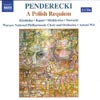Penderecki (A) Polish Requiem
An all-Polish team find the fervour in Penderecki’s heartfelt Requiem
View record and artist detailsRecord and Artist Details
Composer or Director: Krzysztof Penderecki
Genre:
Vocal
Label: Naxos
Magazine Review Date: 1/2005
Media Format: CD or Download
Media Runtime: 99
Mastering:
Stereo
DDD
Catalogue Number: 8 557386/7

Tracks:
| Composition | Artist Credit |
|---|---|
| (A) Polish Requiem |
Krzysztof Penderecki, Composer
Antoni Wit, Conductor Izabella Klosinska, Soprano Jadwiga Rappé, Contralto (Female alto) Krzysztof Penderecki, Composer Piotr Nowacki, Bass Ryszard Minkiewicz, Tenor Warsaw Philharmonic Choir Warsaw Philharmonic Orchestra |
Author: Arnold Whittall
When Krzysztof Penderecki conducted the first complete recording of his Polish Requiem, the soloists were Polish but the orchestra and chorus were Swedish. This new recording, an all-Polish affair, certainly can’t be faulted for lack of fervour, and the work’s origins in a setting of the Lacrimosa dedicated to Gdansk shipyard workers who died during clashes with the Communist authorities in 1970, helps to explain the mixture of intensity and deliberation with which Penderecki approached his task.
I was fairly dismissive of the work in 1997, and I can’t say that I’ve warmed greatly towards it since. At worst, there’s a tendency to swing between bombast and sentimentality which makes one long for the austerity of an Arvo Pärt. Nevertheless, if you approach it as a valid attempt to continue the tradition of 19th-century concert Requiems – Verdi’s, above all – then you might feel that it has much to offer.
This performance is well played and conducted, Antoni Wit ensuring that the big climaxes make their effect without labouring the less eventful episodes. The choral singing is robust, though the sustained high writing is demanding enough to give the Polish Philharmonic Choir some anxious moments. Of the vocal soloists, both Jadwiga Rappé (also on the Chandos recording) and Piotr Nowacki are excellent, but the normally reliable Izabella Kosinska was clearly under strain, and Ryszard Minkiewicz also sounds out of sorts in places. Finally, the sound is typical of Naxos’s Polish recordings in being rather too bright and generalised for music which depends for its effect on such strong contrasts between the very quiet and the extremely loud.
I was fairly dismissive of the work in 1997, and I can’t say that I’ve warmed greatly towards it since. At worst, there’s a tendency to swing between bombast and sentimentality which makes one long for the austerity of an Arvo Pärt. Nevertheless, if you approach it as a valid attempt to continue the tradition of 19th-century concert Requiems – Verdi’s, above all – then you might feel that it has much to offer.
This performance is well played and conducted, Antoni Wit ensuring that the big climaxes make their effect without labouring the less eventful episodes. The choral singing is robust, though the sustained high writing is demanding enough to give the Polish Philharmonic Choir some anxious moments. Of the vocal soloists, both Jadwiga Rappé (also on the Chandos recording) and Piotr Nowacki are excellent, but the normally reliable Izabella K
Discover the world's largest classical music catalogue with Presto Music.

Gramophone Digital Club
- Digital Edition
- Digital Archive
- Reviews Database
- Full website access
From £8.75 / month
Subscribe
Gramophone Full Club
- Print Edition
- Digital Edition
- Digital Archive
- Reviews Database
- Full website access
From £11.00 / month
Subscribe
If you are a library, university or other organisation that would be interested in an institutional subscription to Gramophone please click here for further information.




